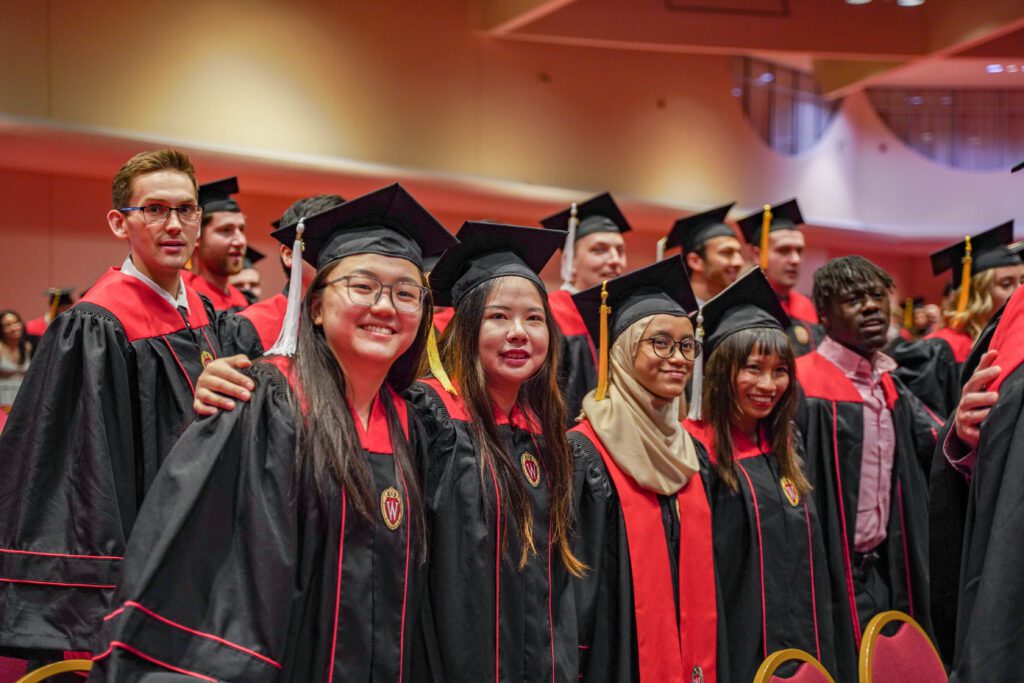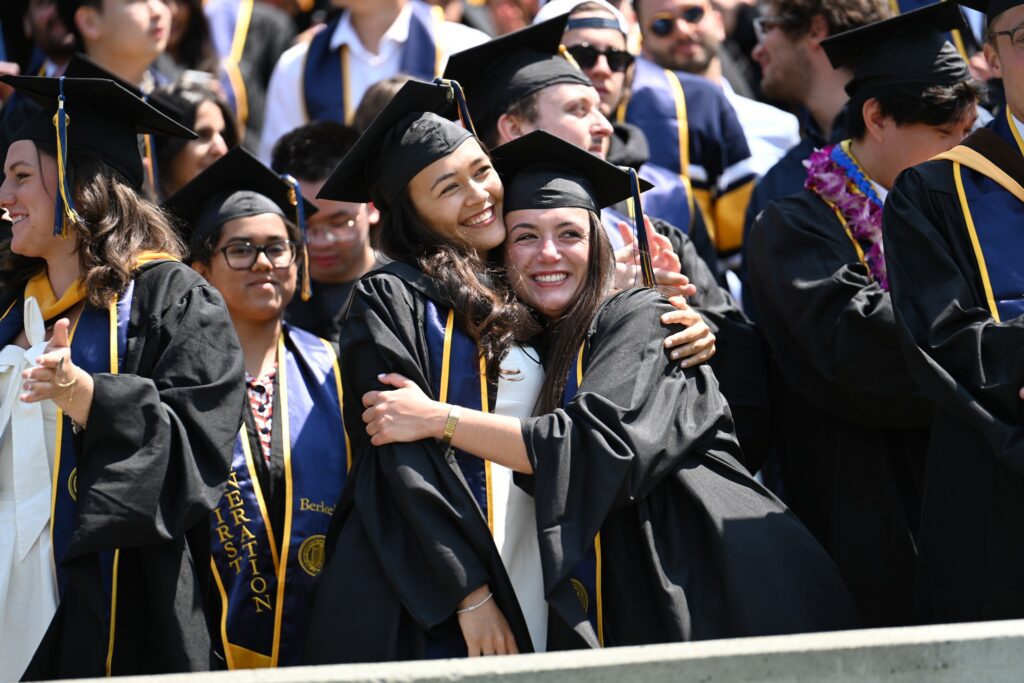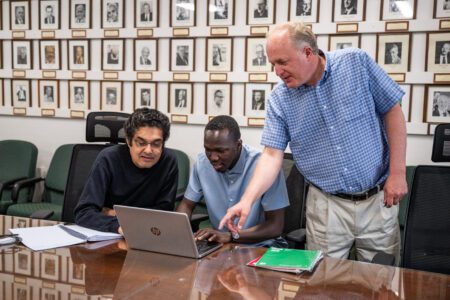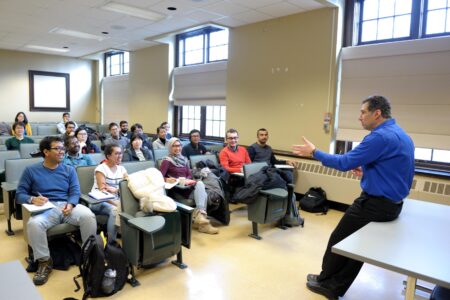
Economists play a profound role everywhere, from shaping health policies to tackling climate change challenges. But with resources always in short supply and human welfare hanging in the balance, this is a field that requires constant, nuanced reassessment of how societies —fluid and ever-shifting — allocate their scarce assets.
The most successful economists embrace this complexity. They seek fresh ideas and smart solutions. They’re behind world-changing discoveries such as more money, over the long run, won’t buy more happiness and that countries that started out with more inclusive institutions during the colonial period tended to become wealthier and more prosperous.
If you want to make similar impact to the likes of these laureates, consider advancing your studies at these leading North American economics departments:

University of Wisconsin–Madison’s Master’s in Quantitative Economics (MSQE) prepares you for high-impact careers in data science, finance, policy analysis, and beyond. Source: University of Wisconsin–Madison
University of Wisconsin–Madison
The University of Wisconsin–Madison’s Department of Economics excels in research and teaching. Ranked among the top 15 economics departments in the nation, one of the largest department in the College of Letters & Science has more than 40 faculty members, 12 teaching lecturers, 1,700 undergraduate students, over 200 master’s students and more than 120 PhD students in residence. Here, your professors are award-winning researchers and recognized for their teaching excellence.
Building on this legacy, the new STEM-designated Master’s in Quantitative Economics (MSQE) offers a contemporary, industry-focused alternative to traditional economics degrees that usually serve as a bridge to a PhD. The MSQE is tailored for various profiles. It’s useful for those without prior economics training who want to learn how to conduct quantitative economics analysis (such as game theory and causal inference), as well as economics undergraduates who want to learn methods that are normally taught in graduate programs.
The curriculum blends graduate-level economics with cutting-edge quantitative methods, including econometrics, data science, and machine learning. You gain not only a deep mastery of economic theory but also practical expertise in modern tools like Python and R as well as intensive training in economic modeling and data analytics, a hallmark of Wisconsin Economics’ long tradition of combining theory with quantitative rigor. Internships, applied research, and a capstone project guided by leading scholars bring theory to life. Meanwhile, a dedicated career and placement advisor ensures you make the most of the department’s’ strong industry connections.
What sets the MSQE apart even more is how flexible it is. It can be completed in as little as 18 months and it’s integrated with the MS in Economics program, making it easy to pivot between academic and professional tracks. For those unsure whether to pursue a PhD or head into industry, this structure offers options.
Madison itself adds another layer of appeal: a city known for its beauty, innovation, and research culture. It has beautiful lakes and, excellent food, all in a city with a low cost of living and a deep sense of community that isn’t available in larger cities.
Graduates are set to emerge career-ready and capable of making an impact in central banks, tech giants, elite consulting firms, and more – as scores of past department graduates have done. Apply to the MSQE here.

In addition to an outstanding research environment, the support you get from the faculty will prove helpful. Source: Columbia University
Columbia University
Belén Hípola began her PhD studies at Bocconi University in Milan, exploring the relationship between educational policies and economic outcomes. Wentao Hu is charting a professional path towards asset management, with aspirations of later pursuing a PhD. Michael Swistara, blending his passions with the quantitative research skills he developed during his MA, went on to earn a JD with a focus on Environmental Law. Kyle Hurysz is launching a new nonprofit in the summer of 2024, the National Coalition for Disabled Students.
These are just a few of the graduates of Columbia University’s Master of Arts Programme in Economics — and their professional and academic trajectories showcase the diverse pathways this programme has helped pave for its students. Graduates have a track record of progressing to a wide range of chosen careers and advanced study.
From the World Bank to multinational financial and tech firms to competitive doctoral programmes, there’s a growing demand for professional and research economists equipped with advanced understanding of economics and its practical applications. The quantitatively oriented MA not only prepares students for diverse positions that involve applying frontier economics methods but also lays a foundation for advanced doctoral studies in economics, with alumni matriculating to PhD programmes at esteemed institutions such as Harvard, Yale, Berkeley, Cambridge, and more.
Beyond the classroom, the Master of Economics Student Association (MESA) fosters a vibrant community within the programme through a mix of professional and social events, offering access to valuable resources like alumni networks, professional development opportunities, and mentorship. Past events include holiday gift exchanges, alumni panels, networking events, and many more.
The best part? Columbia’s campus is located in New York City’s Manhattan, placing you at the crossroads of global finance, arts, and culture. Benefit from access to industry leaders and professional opportunities that have led graduates to roles at Goldman Sachs, McKinsey, Apple, and more. You will receive support throughout your job search or doctoral application from a dedicated team of advisors. Students can leverage the resources offered by the Graduate School of Arts & Sciencesa, including GSAS Compass, for tailored career counseling and workshops.

In recent years, Berkeley Economics PhD graduates have been recruited by prestigious institutions like Harvard, MIT, Yale, the US Federal Reserve, and the World Bank. Source: UC Berkeley/Facebook
University of California, Berkeley
From humble beginnings as a “Political Economy” department with a single faculty member, UC Berkeley’s Department of Economics is today ranked #3 in the US by US News & World Report.
Established in 1903, the department has a distinguished faculty known for its creativity and groundbreaking work across various economic fields. Together with their students, they have led pioneering research in economic theory, econometrics, and major applied areas.
Their expertise extends beyond theory, as evidenced by their roles as policymakers at the highest levels, both domestically and internationally. Last year, professors Emmanuel Saez and Gabriel Zucman were named 2023 Citation Laureates, a recognition of their work as Nobel Prize-class. The previous year, Quantedge Presidential Professor Yuriy Gorodnichenko won the RK Cho Economics Prize, an award reserved for scholars who have contributed to the development of scholarship and education.
For aspiring economic scholars, the department offers a prestigious PhD in Economics program designed to cultivate original research and advanced study. The comprehensive program progresses through two stages: preparation for candidacy and dissertation completion.
The former stage equips students with essential knowledge of econometric methods, economic history, and core microeconomic and macroeconomic theory. Specialisation and independent research take centre stage during the following years, ending in a dissertation representing a significant contribution to the field.

Due to the department’s diverse graduate teaching staff, you have the opportunity to customize your studies. Source: University of Toronto/Facebook
University of Toronto
Since 1888, economics has been the most popular discipline among undergraduate students at the University of Toronto’s Faculty of Arts and Science, with nearly 70% taking at least one course during their studies.
Today, the Department of Economics is one of the largest in the Faculty of Arts and Science, with more than 3,000 students, and ranked among the top 20 globally and first in Canada (Tilburg University Top 100 Worldwide Economics Schools Research Ranking).
A wide variety of undergraduate and graduate programmes are available here, ranging from the Economics Minor, Major, and Specialist Programmes to various joint programmes, including the highly popular Specialist Programme in Commerce and Finance, offered jointly with the Rotman School of Management.
Master’s and PhD programmes here aim to enhance capacity for economic analysis through rigorous instruction in theory, econometrics, and a wide range of related fields. It’s education that wins awards – recently, a second year PhD student of economics won the best poster award at a biotechnology conference and another was named one of the winners of the inaugural Rising Star Award for her job market paper “Skill Mismatches and Earnings Inequality Among College Graduates.”
Because of the size and diversity of the teaching staff, students can readily specialise in almost any area of interest. Candidates may take courses in political science, management, history and other allied fields as well. All of this makes for a well-rounded education, as seen in how graduates are in demand in academia, industry, and government. Graduates often go on to hold professorial positions and secure employment in the public service and private industry.
*Some of the institutions featured in this article are commercial partners of Study International










